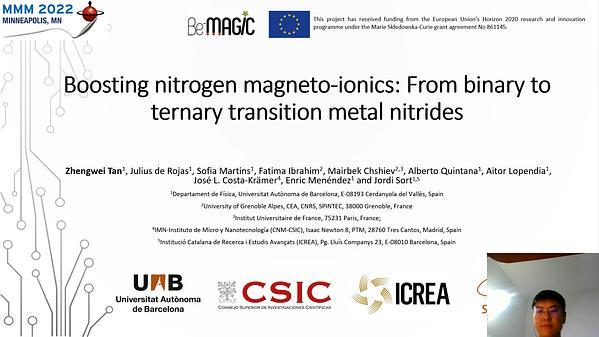Would you like to see your presentation here, made available to a global audience of researchers?
Add your own presentation or have us affordably record your next conference.
Hydrogen is one of the most promising species for fast magneto-ionic control in iron triad metals. (1,2)
In this case, a voltage, which is applied to the magnetic metal via a solid or liquid electrolyte, (3) triggers proton reduction and subsequent hydrogen ad- and absorption. The composition of the electrolyte may have a great influence on these processes, since the absorption of hydrogen in metals is highly dependent on the pH values, (4) and moreover, additives to electrolyte can improve hydrogen permeability and diffusivity in ferromagnetic metals. (5)
However, this knowledge has not been applied and tested for magneto-ionic systems yet. Thus, the optimization of electrolyte composition and the use of additives to promote hydrogen ad- or absorption may be a promising pathway to increase the efficiency of magneto-ionic systems.
In this work, we study the influence of alkaline electrolyte composition on the H-based magneto-ionic effect in electrodeposited nanocrystalline Ni films. In Ni, H is expected to significantly modulate the magnetization. (6)
The voltage-triggered changes in magnetic properties are analyzed by in situ Anomalous Hall effect and in situ SQUID measurements in aqueous electrolytes with different concentrations of KOH (0.5, 2 and 5 M), as well as in 0.5 M KOH with thiourea additive.
H-based magneto-ionic control is clearly demonstrated by a voltage-controllable decrease and increase of saturation magnetization of the Ni films upon hydrogen absorption and desorption, respectively. We find that an increase in electrolyte pH and the addition of thiourea improves the efficiency of the H-based magneto-ionic effect. Results of in situ Raman spectroscopy indicate that the enhancement of H-absorption by thiourea relates to the formation of a Ni(OH)2 layer on the Ni surface.
The obtained results should stimulate further research in the field toward the use of multicomponent electrolytes and the optimization of underlying chemical and electrochemical reaction mechanisms to improve magneto-ionic efficiency.
This research was funded by the European Union’s Horizon 2020 research and innovation programme under the Marie Sklodowska-Curie grant number 861145.
References:
(1) Tan, A. J. et al. Magneto-ionic control of magnetism using a solid-state proton pump. Nat. Mater. 18, 35–41 (2019).
(2) Huang, M. et al. Voltage control of ferrimagnetic order and voltage-assisted writing of ferrimagnetic spin textures. Nat. Nanotechnol. (2021) doi:10.1038/s41565-021-00940-1.
(3) M. Nichterwitz, S. Honnali, M. Kutuzau, S. Guo, J. Zehner, K. Nielsch, and K. Leistner. Advances in magneto-ionic materials and perspectives for their application. APL Materials 9, 030903 (2021).
(4) Fujimoto, N., Sawada, T., Tada, E. & Nishikata, A. Effect of pH on Hydrogen Absorption into Steel in Neutral and Alkaline Solutions. Mater. Trans. 58, 211–217 (2017).
(5) Latanision, R. M. & Kurkela, M. Hydrogen Permeability and Diffusivity in Nickel and Ni-Base Alloys. CORROSION 39, 174–181 (1983).
(6) León, A. et al. Magnetic effects of interstitial hydrogen in nickel. Journal of Magnetism and Magnetic Materials 421, 7–12 (2017).
